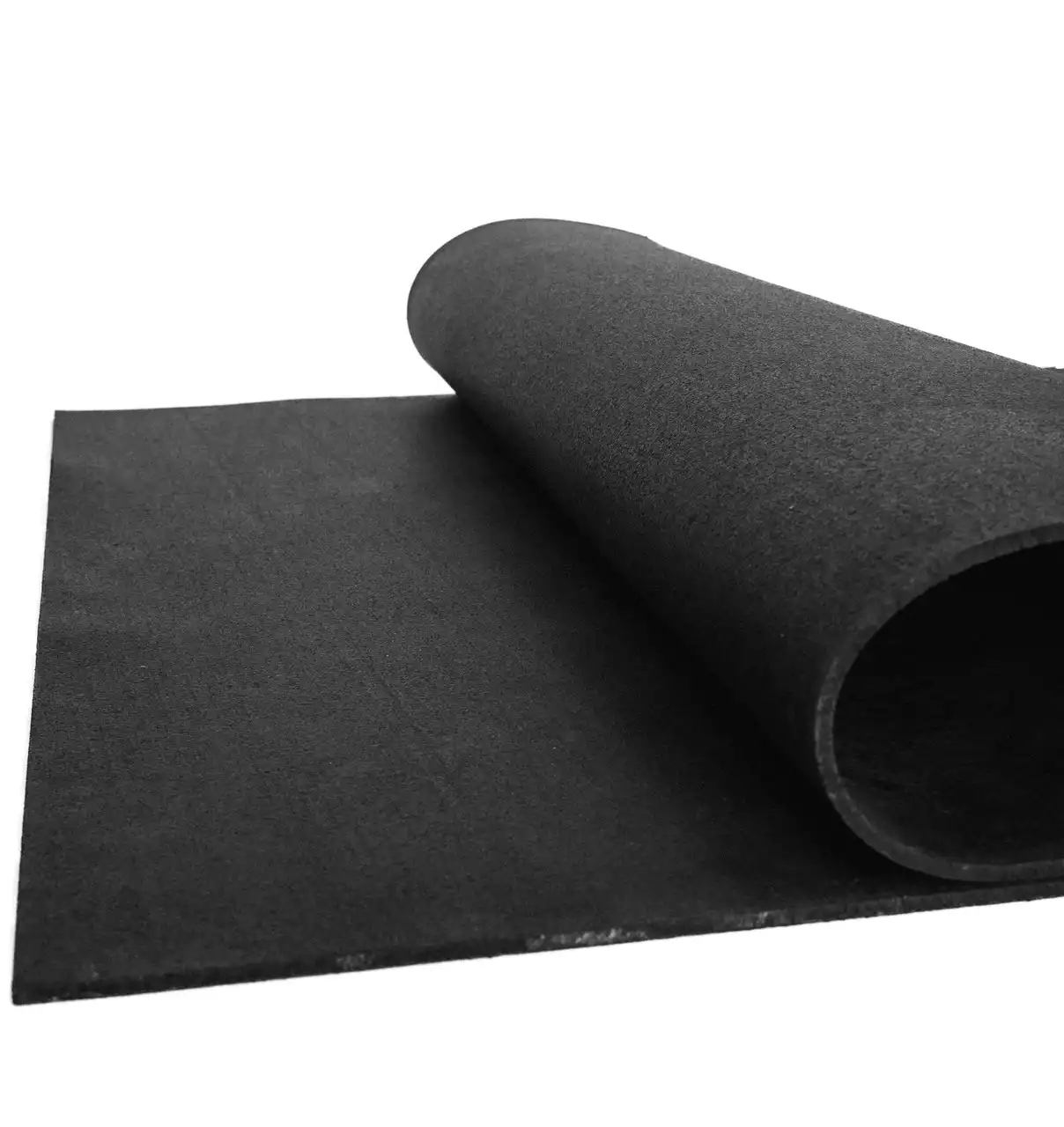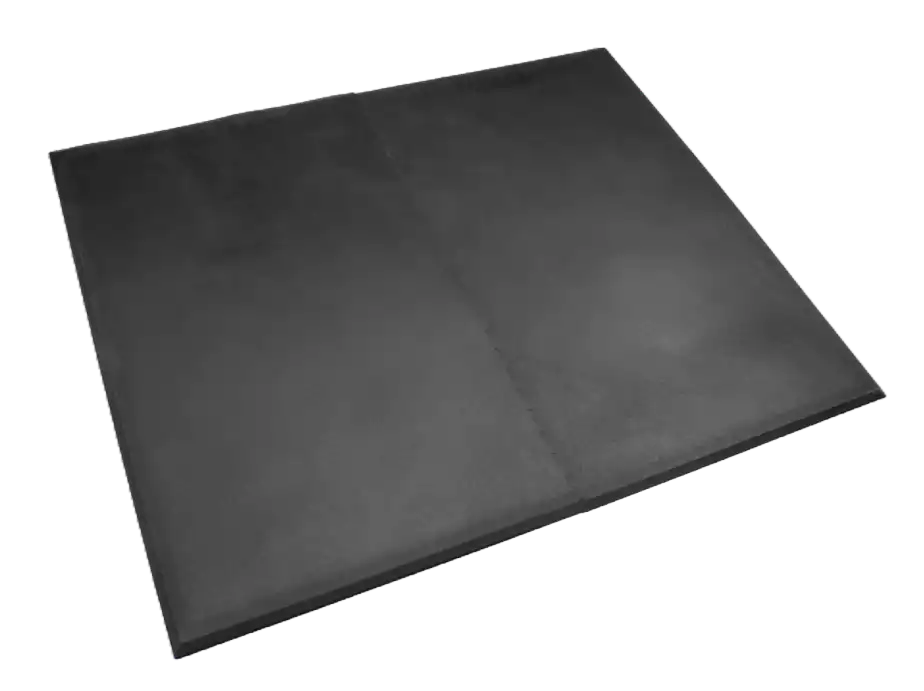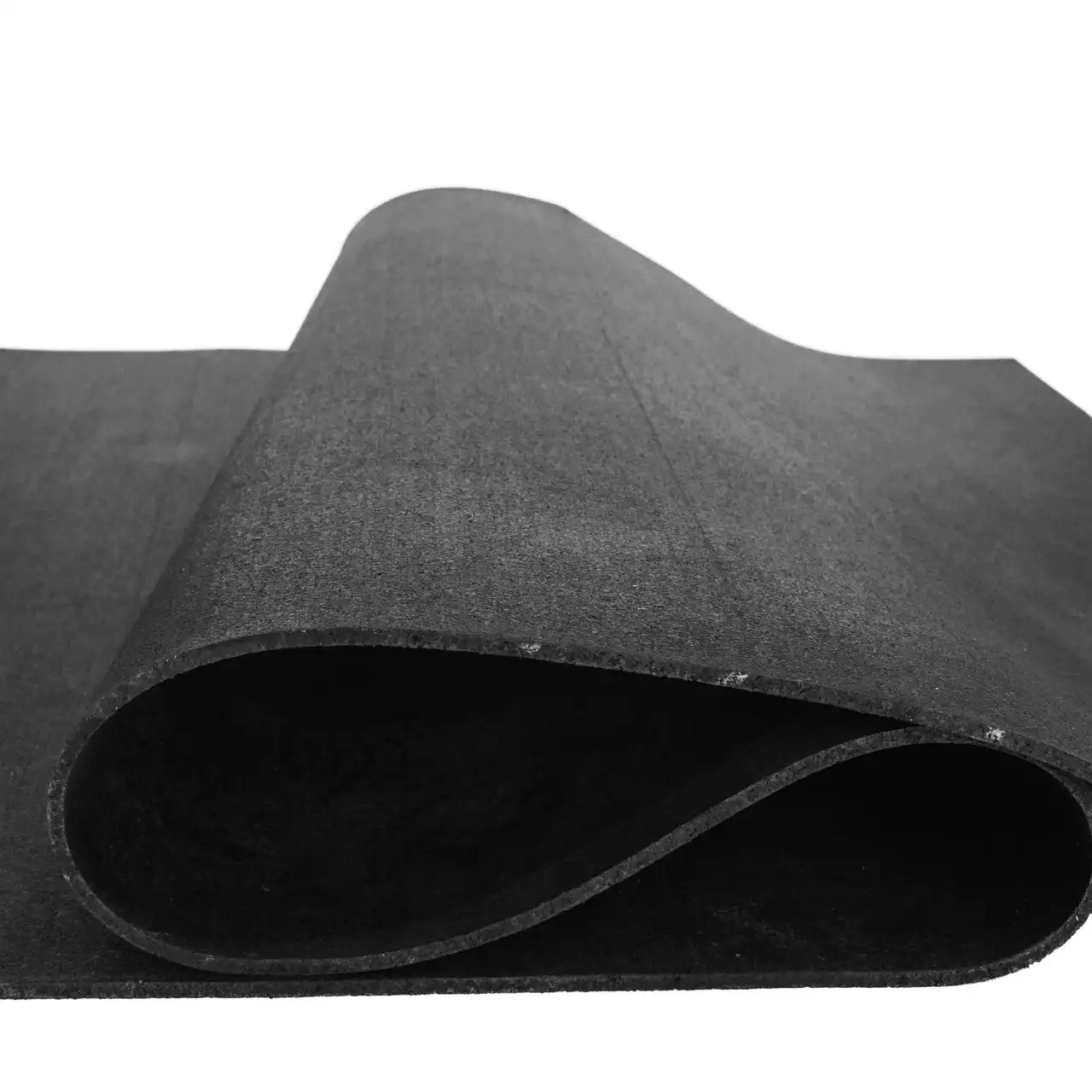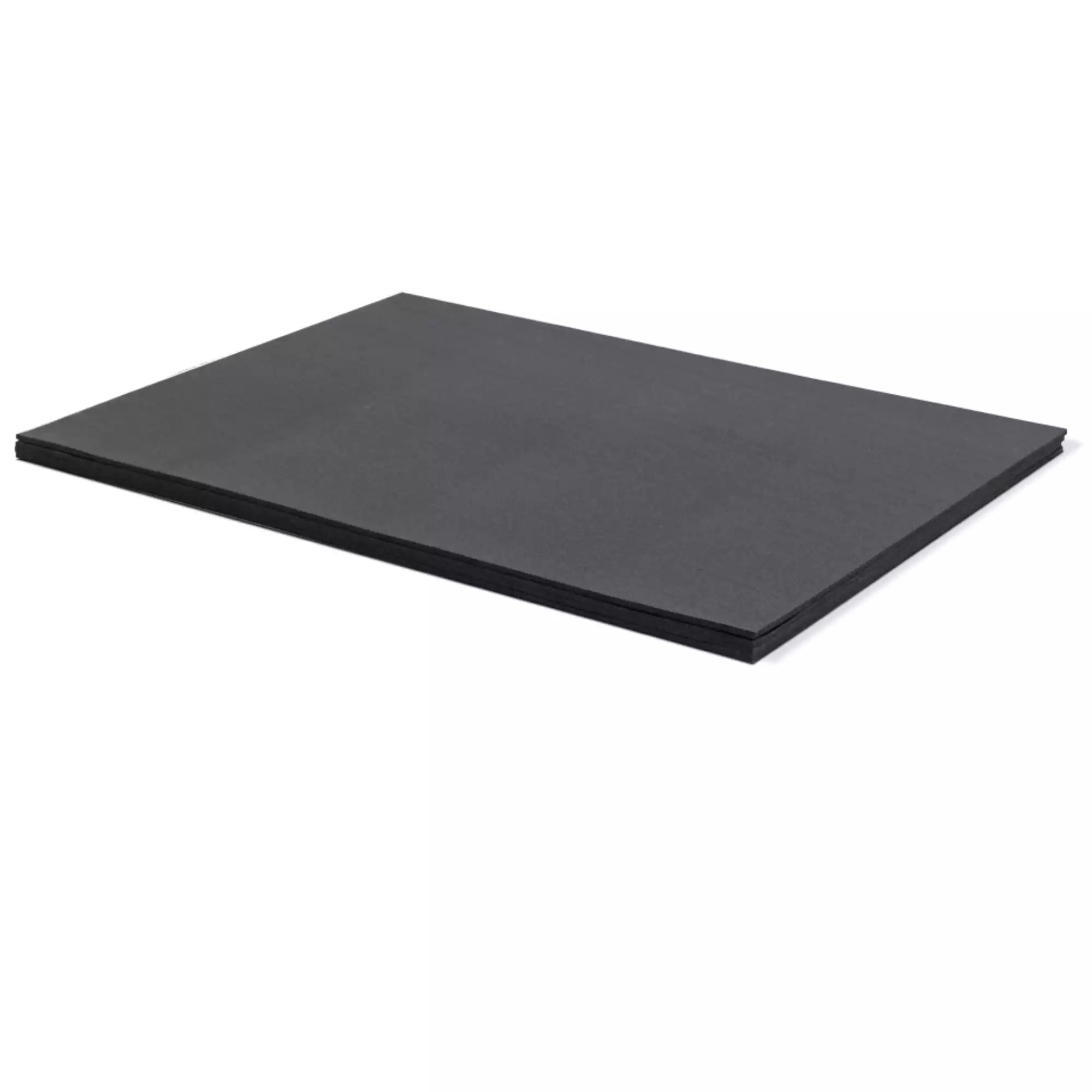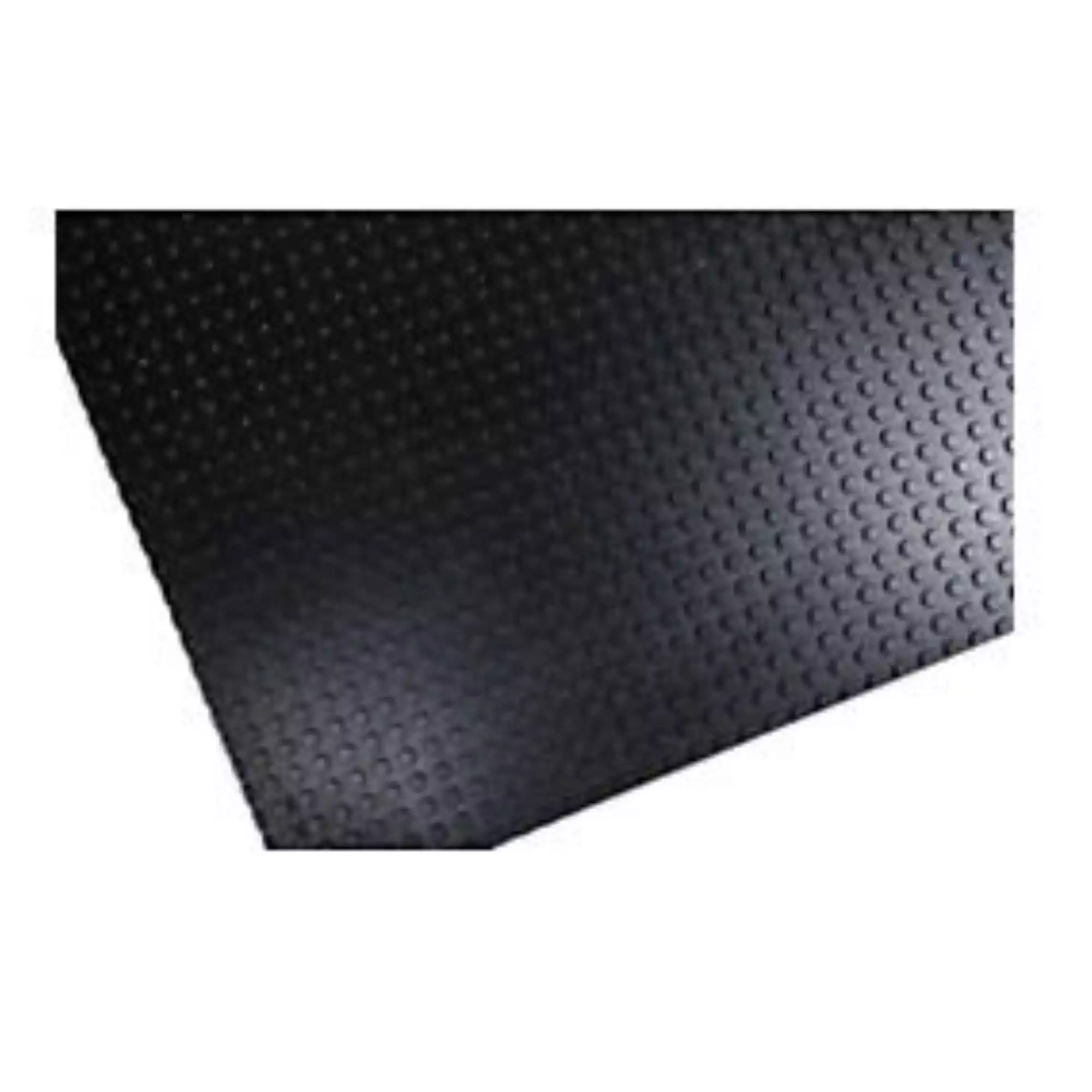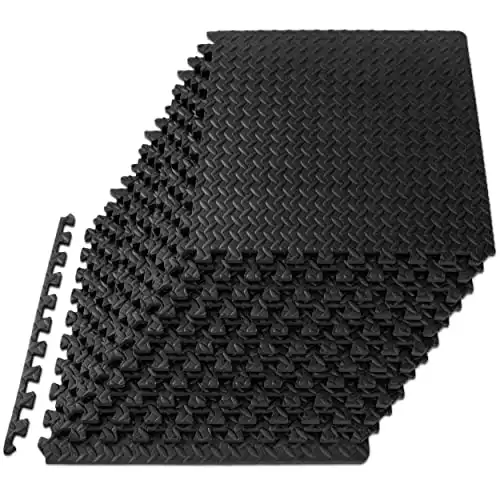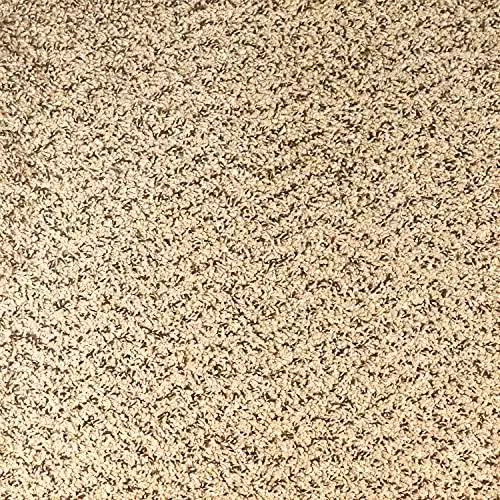Whether you’re on the cusp of starting your home gym or worried about your equipment’s lifespan due to your lack of proper flooring, you’re not alone. And while aesthetics certainly play a part, the wrong flooring can be a serious hazard. It can damage your gym equipment or your floor, or worse, increase your risk of injury.
Before starting my home gym, I spent hours researching and sifting through several options, trying to find the best home gym flooring that could withstand heavy weights, high-intensity cardio workouts, and everything in between.
This article compiles that exhaustive research, coupled with my experience training on different types of flooring in commercial gyms, to guide you through the maze of choices and help you invest in a flooring solution that’s right for you.
How We Chose the Best Home Gym Flooring
We chose the best home gym flooring options by doing a careful analysis of various factors. It was important to us that we give many options based on different exercise styles, including bodyweight training, yoga, CrossFit, and powerlifting.
We also wanted to make sure our choices reflected a range of budgets to accommodate those who want the best value. That said, we included some higher-end brands (like Second Skin) for those who are willing and able to pay more for higher quality and more durability.
Finally, we made sure to include different types of flooring for the many home workout environments that home gym owners would have (concrete, carpet, and hardwood) to ensure the list represents the best options out there.
Our Top Picks for the Best Home Gym Flooring
Best Home Gym Flooring Overall: Rubber Flooring Inc. 8mm Strong Rubber Roll
Pros
- Free custom-cutting to any length over 15 feet (rounded to the nearest foot) with 20 color fleck variations available
- Five-year warranty on standard color options and a 25-year warranty on the Biggie Smallz™ colors
- 30-day money-back guarantee
- USA-made
- Eco-friendly and made mostly from recycled rubber materials
Cons
- May have a rubber odor when it first arrives
- DIY installation may be challenging for some
- The rolls may curl or shift slightly over time
When it comes to outfitting your space with the best home gym flooring, the Rubber Flooring Inc. 8mm Strong Rubber Roll stands out as the ideal choice.
Unlike most flooring rolls that come in preset increments only (like 15, 50, or 100 feet), the 8mm Strong Rubber Roll can be ordered in one-foot increments starting at 15 feet. If your space is precisely 17 feet in length, for example, you can order that exact amount. Rubber Flooring Inc. will even custom-cut it for free and give you a couple of extra inches on each roll just in case.
This feature is underrated. With other companies, custom cuts aren’t available at all, so you’d be forced to buy a single 15-foot roll and leave two feet of your floor incomplete, or pay for two 15-foot rolls to cover the entire workout space just to be stuck with a bunch of leftover material.
The roll is available in 20 different color variations, from classic Black to Lipstick Red, so you can add some pizzazz to your rubber gym flooring.
The 8mm Strong Rubber Roll is made in the USA, which is appealing to those who want to support the American economy and value the higher standards that American manufacturing must meet. Rubber Flooring Inc. offers a five-year warranty on standard colors and an impressive 25-year warranty on its Biggie Smallz™ colors, which is one of the best warranties I’ve ever come across for rubber gym flooring. Plus, the company offers a 30-day money-back guarantee for customers in the United States and Canada.
It will most likely emit a rubber odor at first since it’s mostly made from recycled rubber. The smell can be unpleasant, but to reduce it, you can air out the rubber roll and/or clean it with a mild soap and water solution before installation.
The installation might be a hurdle if you have no DIY experience. I did find the video in the company’s “Install Info” helpful, but you’ll still need a good understanding of how to use basic tools (measuring tape, t-square, and utility knife) and fundamental construction principles. If you have no experience in this field, calling a professional would be a smart decision.
Lastly, the rubber roll may curl or shift slightly over time with drastic temperature changes or if heavy things get dragged across it — like a fully loaded bumper plate tree. To prevent this, you can use double-sided tape to secure the rubber roll sticks to the floor.
Best Rubber Flooring for Home Gyms: Second Skin Stomp Roll
Second Skin Stomp Roll
- Material: Recycled rubber
- Dimensions: 4’ W x 15’, 25’, or 50’ L
- Thickness: ¼ inch, eight millimeters, ⅜ inch, ½ inch, or ¾ inch
- Suitable for: General fitness, HIIT, powerlifting, and Olympic weightlifting
Pros
- Five thicknesses that are suitable for low- to high-impact activities
- Includes noise-reducing technology
- Has a mild odor
- USA-made
- Made from recycled rubber materials
Cons
- Only available in black
- Custom cuts cost extra
- DIY installation may be difficult
If you are looking for rubber flooring that can reduce noise and vibration from your home gym equipment, you may want to consider the Second Skin Stomp Roll.
Second Skin is originally known for auto and audio soundproofing, but many of its products are also used in gyms due to their excellent noise and vibration dampening. This distinctive feature makes the Stomp Roll a solid choice for home gyms where quieter workouts are essential due to shared living spaces or the sleep schedules of young children.
With five different thicknesses to choose from, you’re almost guaranteed to find one that’s suitable for your exercise style. The quarter-inch thickness is great to place under any of the best treadmills or for bodyweight training, while the ¾-inch thickness is ideal for general weight training and HIIT. If powerlifting, CrossFit, or Olympic weightlifting is more your style, the ¾-inch thickness can provide enough protection for your floor when placed on top of plywood like on a lifting platform.
Despite being made from old tires, the Stomp Roll’s product page claims an “extremely mild odor.” I can’t confirm the strength of its smell but if true, this is a significant advantage over the many rubber flooring options that tend to off-gas unpleasant odors for weeks after installation. For those with asthma or other respiratory conditions (even just a sensitivity to scents in general), having near-odorless flooring can make a difference.
If adding flair to your rubber gym flooring is important to you, you’ll be disappointed to see that the Stomp Roll is only offered in black.
Furthermore, unlike the Rubber Flooring Inc 8mm Strong Rubber Roll mentioned previously, custom cuts of the Stomp Roll cost extra. Custom lengths are “available on request” and one customer even left a review saying, “I had a very custom project… They cut my pieces exactly as I asked for at a very fair price!”
While it’s great to know that you can get custom lengths other than the default 15-, 25-, and 50-foot lengths, I would be more impressed to see them offered at no extra charge.
The Stomp Roll’s installation process is simple but requires some basic DIY skills and understanding. If you’re not comfortable with self-installation, help from a professional may be necessary but will add to the overall cost. Keep this in mind, especially if you prefer a hassle-free setup.
Best Home Gym Flooring Over Concrete: Rogue Power Platform
Rogue Power Platform
- Material: Recycled rubber
- Dimensions: 90” W x 72” L
- Thickness: ¾ inch (19 millimeters)
- Suitable for: General weight lifting, HIIT, CrossFit
Pros
- The diamond-pattern top gives a good grip even when slick
- Can be used indoors or outdoors
- The ¾-inch thickness and waffle-pattern impact zones minimize noise and vibrations
- Easy installation due to the interlocking design
- Made in the USA
- Eco-friendly
Cons
- The fixed size might not suit all gym spaces and trimming it might damage the interlocking mat system
- Expensive compared to budget-friendly alternatives
- Potentially unstable with extremely heavy weights
The Rogue Power Platform is an excellent flooring choice for anyone with a concrete floor because of its durable rubber construction and waffle-pattern impact zones. The diamond-pattern top layer also gives it a better grip even in slick conditions, which is great for those who might prefer to have their home gym outside and work out in humid conditions.
RELATED: The Dangers of Outside Workouts
The ¾-inch thickness provides serious durability, making it ideal for general weight lifting, HIIT, and CrossFit. The waffle-pattern impact zones dampen noise and vibrations, which helps keep your concrete floor protected and your neighbors happy.
While it might seem extra-wide, the 90-inch width ensures that every weight plate on your favorite Olympic barbell will be supported with three inches on each side to account for occasional sideways movement. The default 72-inch length is surprisingly roomy and can accommodate two barbell setups for you and your workout partner when doing controlled exercises like deadlifts or rows.
The mats feature a modular, loose-lay interlocking system and sections with beveled edges. Installation is fairly straightforward with no adhesive required. For those not super DIY knowledgeable, this is a big relief.
However, its 72″ x 90″ footprint may not suit all spaces, and trimming it might damage the interlocking mat system.
If you’re into Olympic lifting, the Power Platform isn’t the best choice. At 72” long, this is the minimal length you should accept for weightlifting. While it technically could work, your feet could land beyond the perimeter of the platform during a split jerk if you have long legs. In the event of a bailed lift, it’s only a matter of time before a failed snatch or clean and jerk lands off the platform and damages your floor. A better option for Oly lifting is the Rogue 8’ x 8’ Oly Platform.
The Power Platform is also more costly at $399 compared to budget-friendly alternatives like 4’ x 6’ horse stall mats from Tractor Supply, where a single mat can be found for around $60. Two horse stall mats would total roughly $120 and, when joined together, would offer a bigger platform for less than half the cost.
Finally, the platform might be less stable with ultra-heavy weights due to the rubber material. After all, there’s a reason why lifting platforms usually have a centerpiece made out of wood — it’s more firm than a rubber surface. While this would probably be unnoticeable with light to moderate weights, it’s worth pointing out for those who want to lift heavy.
Best Home Gym Flooring Over Carpet: Second Skin Stomp Mat
Second Skin Stomp Mat
- Material: Recycled rubber
- Dimensions: 4’ W x 6’ L
- Thickness: ¼ or ½ inch
- Suitable for: Bodyweight training, general weight lifting, HIIT
Pros
- Shock-absorbing properties to protect your floor from damage, whether it’s from a treadmill or barbell
- Includes noise-reducing technology
- Installation is a breeze
- No adhesive needed
- USA-made
- Eco-friendly
Cons
- No ¾-inch thickness
- Costly
- Even when weighed down by heavy equipment, these mats can shift slightly over time
The Stomp Mat offers several advantages that make it the most appealing choice and the best home gym flooring option to place over carpet. With its shock absorption capabilities, it safeguards your carpet fibers from getting torn up while also protecting your existing subfloor from damage.
The ¼-inch mat weighs 30 pounds (13.6 kilograms) and provides excellent noise reduction, making it a great option for supporting standalone exercise equipment like a high-quality rowing machine or treadmill. The weight of the machine on top of the mat tends to keep it in place. The ½-inch thick mat, on the other hand, weighs 60 pounds (27.3 kilograms) and offers even more sound isolation and flooring protection.
The Stomp Mat lacks a ¾-inch thickness option. This limits its suitability for powerlifting-style training because it may not be able to handle significantly heavier weights. It’s also not a great choice for Olympic lifting or CrossFit because the thinner options won’t be able to withstand repeated weight drops from overhead.
Additionally, it’s relatively costly compared to budget options. The ¼-inch mat is priced at around $99.99, and the ½-inch mat costs around $179.99. A ¾-inch horse stall mat from Tractor Supply Co. costs about $60, offering more thickness at a lower price.
Because it’s a mat instead of a roll, installation is a breeze. Simply lay it over your carpet, and place your equipment on top or get lifting.
You technically don’t need adhesive, but double-sided flooring (carpet) tape or rubber adhesive applied around the edges of the mat is a wise choice. Even when weighed down by heavy-duty cardio machines, these mats can shift slightly over time. If using multiple mats, you can also place mending plates under the mats where their seams join to keep them from separating over time.
Best Home Gym Flooring Over Hardwood: REP Fitness 3’ x 4’ Floor Mats
Pros
- Smooth top makes floor exercises like sit-ups and push-ups more comfortable
- Textured bottom helps prevent the mats from slipping
- ⅜” thickness can help protect your hardwood floors from general weight training
- No odor
- USA-made
Cons
- The mats have a ½-inch tolerance, so small gaps between mats can happen
- Roughly the same cost as horse stall mats, but only half the size
- Not thick enough to protect your floors from heavy lifts or dropped bars.
The biggest feature that stands out to me with the REP Fitness 3’ x 4’ Floor Mats is the non-grooved, textured bottom. Horse stall mats have slots or grooves on the underside for improving drainage. This is great for livestock and industrial applications but serves very little purpose in a home gym. Instead, a fully flat underside lets the entire mat have complete contact with your floor. In addition to the textured underside on REP’s floor mat, this combo ensures that the mat doesn’t slip, and we think this makes it the best choice to put over your hardwood floor.
REP Fitness went a step above with its floor mats by having a smooth top. Economical horse stall mats almost always have a textured pattern to give grip for livestock, but this is annoying at best and potentially injurious at worst because the largest textured patterns can cause barbells to ricochet randomly upon landing. Having a smooth top eliminates this concern and makes bodyweight exercises like push-ups and sit-ups much more comfortable because there’s not a raised rubber pattern digging into your skin.
RELATED: 10 Push-Up Variations for More Muscle and Strength
Although the mats are laser-cut, they are listed to have a ½-inch tolerance. This means that small gaps should be expected when you put two or more mats together. The functionality of the mats isn’t impacted by this, but if you dislike the aesthetic of the gaps, placing extra-thick Gorilla tape over the seam will give a nicer finish. The ⅜-inch thickness is supportive enough to withstand HIIT workouts with light to moderate weights and general weight training.
The mats are sold in groups of five or 10 mats. You’ll pay about $54.99 per mat for the 10-pack and around $73.20 for the five-pack. Although the Tractor Supply Co. mats are priced similarly, they are still a better value because they give you a 4’ x 6’ surface — double the square footage — for about the same cost.
These mats alone are not suitable for protecting your hardwood floors from powerlifting or Olympic weightlifting. Heavy weights and barbells dropped from overhead require a special flooring solution like a lifting platform. Usually made from plywood and rubber mats, a platform helps to deaden the impact of a loaded barbell while the platform’s large footprint disperses the force across a larger surface area.
If you train for either of these sports, you can place the REP Fitness 3’ x 4’ Floor Mats on top of a wooden platform, but I wouldn’t recommend using them on their own.
Best Budget Home Gym Flooring: Tractor Supply Co. Stall Mats
Pros
- Budget-friendly
- Durable
- ¾-inch thickness to protect your floors from high-impact exercise
- USA-made
- Eco-friendly
Cons
- Textured top isn’t an ideal surface for lifting (though you can flip it over so the smooth side faces up)
- Can have a strong odor at first
- Each mat weighs about 100 pounds (45.5 kilograms)
Tractor Supply Co.’s Stall Mats have become a popular choice for budget-conscious athletes and fitness enthusiasts looking for the most durable flooring solution at an affordable price. Priced at about $56.99 per mat, they’re a fraction of the price of the Second Skin Stomp Mat. If you’re looking for the rubber gym flooring option that offers the best bang for your buck, stall mats can be a solid option.
Originally designed for livestock stalls, these mats are made of durable rubber and are available in a heavy-duty ¾-inch thickness. They can withstand heavy weights, but they’re also ideal for general weight training and HIIT. When combined with a layer or two of plywood to create a lifting platform, they’re excellent for CrossFit, powerlifting, and Olympic lifting, too.
It’s common for one side of stall mats to have a raised texture. This raised pattern can vary in size from small squiggles to large circles. The larger the texture, the more uncomfortable it is against your skin and the more likely it will be to cause barbells to not sit straight or ricochet when they return to the floor. To avoid this, simply put the patterned side down so you can lift on the smooth side.
Stall mats are also notorious for being smelly. In fact, one customer review said, “…they do smell, really badly, but the smell does go away eventually.”
I’ve found this to be true as well. When I first bought stall mats for my garage gym, I had to air them out for close to a week before the smell dissipated. I’d recommend that you do the same. If the smell is still very strong after several days, wash the mats with mild soap and water, and let them air dry before installing.
Each mat weighs almost 100 pounds (45.5 kilograms). This makes moving and installing them challenging. Unless you’re a large and strong person, you’ll benefit from having a friend help you move them. Consider getting them installed professionally to save your back. If doing the installation solo, I’d highly recommend using mat pullers to save your hands and forearms.
Best Interlocking Tile Flooring for Home Gyms: ProsourceFit Exercise Puzzle Mat
Pros
- Offers excellent cushioning and is comfortable to lie on
- Simple installation
- The 12-pack covers a large surface area of 48 square feet or a footprint of 6’ x 8’
- Diamond pattern offers good grip
- Easy to clean
Cons
- Low durability and may show wear and tear more easily
- Lacks the stability of rubber
Made from ½-inch-thick EVA foam, the ProsourceFit Exercise Puzzle Mats provide the right balance of cushioning and support. They’re comfortable to stand or lie on and offer good joint support, making them a great option for bodyweight training, plyometrics, yoga, and Pilates.
One of the standout features of these mats is their interlocking design. They fit together just like puzzle pieces, so assembling them is easy even if you lack DIY skills. I was impressed to see that they also come with a finishing edge to help your area look more professional, something that most interlocking floor products don’t offer.
These foam mats come in a pack of 12 on Amazon, and they cover a surprisingly large area of 6’ x 8’. That said, you can custom-cut each tile with a utility knife if you need them to fit into a specific area for your home gym.
While the EVA foam is comfortable, it’s not as durable as rubber. I’ve seen EVA foam tiles become permanently dented from people who’ve done deadlifts on them or left free weights like adjustable dumbbells sitting in place for too long. In some cases, small tears developed that turned into thumb-sized chunks getting torn out of the floor tiles.
Furthermore, EVA foam is simply too soft to offer the stability you need to lift weights safely. If you use any heavy weights, you’ll feel your feet sinking into the tiles and wobbling around because foam flooring isn’t as dense as rubber tiles or wood.
Best Carpet Tile Home Gym Flooring: Five Diamond Feather Peel and Stick Carpet Tiles
Pros
- Soft and comfortable
- Supportive surface that’s ideal for low-impact, bodyweight activities
- Peel-and-stick tiles allow for easy installation
- The 10-pack of carpet tiles will cover 22.5 square feet
Cons
- Harder to clean
- Lacks durability
- Might need adhesive
The Five Diamond Feather Peel and Stick Carpet Tiles offer a unique flooring solution for home gyms. The carpet fibers provide a soft and comfortable surface that you won’t get from a firm rubber mat. The carpet tiles are a better option than rubber for bodyweight movements, yoga, Pilates, and other low-impact workouts since they won’t cause as much discomfort on your knees or elbows during floor-based exercises.
If you want a similar easy-installation experience as the Interlocking Puzzle Mats provide, carpet tiles are a suitable choice. They have a simple design where you just peel-and-stick them to the floor, making them suitable for those who might not be experienced with DIY projects. They also come in a pack of 10, which covers up to 22.5 square feet.
While the carpet texture is comfortable, it won’t be as durable as other materials like rubber, especially for high-impact workouts. The fibers can snag or get pulled out over time and simply won’t keep up with the durability of flooring like the REP Fitness 3’ x 4’ Floor Mats.
Also, cleaning can be more challenging compared to smooth surfaces, as spills and sweat can get trapped in the carpet fibers. Regular vacuuming will help, but if you’re a heavy sweater, consider deep cleaning the fibers monthly.
Lastly, while the peel-and-stick design is convenient, some areas might require additional adhesive to keep the tiles in place. This is especially true if multiple people use the tiles for their workouts.
Benefits of Home Gym Flooring
Getting proper flooring for your home gym offers several benefits:
- Protection: It safeguards your floors from potential damage caused by heavy gym equipment and accidental (or intentional) weight drops.
- Safety: Quality flooring is grippy and reduces the chances of accidents, slips, and falls. It also absorbs impact, which lowers the stress on your joints.
- Comfort: The right flooring offers cushioning and support. This is especially important for workouts that require floor work, such as yoga. Comfort is also essential for warm-ups and cool-downs, during which you may be doing mobility exercises and dynamic stretches on the floor.
- Aesthetics: Flooring that complements your home gym aesthetic creates a motivating environment.
- Noise reduction: Most types of home gym flooring can help with dampening the noise of weights and machines, especially for your neighbors or when living in shared accommodations.
- Enhanced performance: The right surface can offer better stability during exercises, improving overall workout performance.
What To Consider When Looking for Home Gym Flooring
When looking for the best home gym flooring, there are many things to consider, from the material to the type of exercise you engage in.
It’s also important to know the available space in your home gym, your budget, the flooring durability and thickness, and noise-dampening capabilities.
Material
Materials define the durability, comfort, and suitability of your gym flooring. They can vary from rubber, like the Rubber Flooring Inc 8mm Strong Rubber Roll, or carpet, like the Five Diamond Feather Peel and Stick Carpet Tiles.
Your choice should align with your workout needs first, and aesthetic preferences second.
Type of Exercise
Different exercises require different types of flooring. Lifting weights demands a resilient surface, so you’ll want durable, shock-absorbent rubber flooring for high-impact workouts like powerlifting, Olympic weightlifting, or CrossFit.
On the other hand, yoga or Pilates would benefit from softer and/or thinner flooring like interlocking puzzle mats or carpet tiles.
Your Space
Consider the space you’re working out in. Basements might require moisture-resistant flooring like Rogue’s Power Platform, while a small corner in a bedroom might benefit from interlocking tiles for easy setup and removal.
Do you live in an apartment? Trying to carry horse stall mats up more than one floor will give you a cardio (and forearm) workout you’ll never forget.
Cost
Flooring options vary in price from budget-friendly options like Tractor Supply Co. Stall Mats at $60 per mat to more commercial grade mats like the Second Skin Stomp Mat, which can cost as much as $179.99.
While you might be tempted to go for cheaper options, remember that the investment in quality flooring can save you hundreds (or thousands) in home repairs and equipment replacements in the long run.
Durability
No one wants to replace flooring every couple of years. If you engage in heavy lifting often, opt for products that can withstand the constant pounding, like ½-inch to ¾-inch rubber flooring.
Thickness
The thickness of your flooring plays a significant role in how comfortable you are and how protected your underlying floor is. The Rogue Power Platform, for instance, is ideal for basement and garage gyms because it’ll preserve your concrete floor.
For powerlifting and Olympic lifting, a lifting platform is highly recommended. Even with the best bumper plates, people have damaged their floors when using only ¾-inch stall mats.
Meanwhile, a yoga enthusiast will enjoy their poses and flows much more if performing them on soft, ½-inch thick flooring like puzzle mats or carpet tiles.
Noise-Dampening Capabilities
Certain materials can absorb sound, reducing noise in other parts of the house. If keeping your workouts quiet is non-negotiable, ¾-inch-thick heavy-duty rubber flooring will be your saving grace. Otherwise, thinner flooring options are perfectly fine.
How To Clean Your Home Gym Floors
Maintaining a clean home gym floor is essential, not only for aesthetics but also for hygiene and safety. Different flooring types require distinct cleaning methods to ensure longevity and cleanliness.
Here’s a quick guide of general best practices based on your flooring type. Remember to always consult the company’s recommendations on how to clean their flooring products.
- Rubber: Rubber floors, especially those with textured surfaces, can trap dirt in their grooves. A vacuum cleaner is ideal for such surfaces, but if your gym is in a garage, using a leaf blower can be an efficient way to remove dirt. Remember to wear safety glasses if you opt for this method. For a deeper clean, mop the floor with a mild detergent. To speed up the drying process and reduce humidity, use fans and open windows.
- Carpet: Carpeted floors in a home gym can trap sweat, dust, and dirt. Regular vacuuming, set to the appropriate height based on your carpet fibers, is crucial to remove these particles. Given the increased sweating and humidity in a gym setting, deep cleaning becomes even more vital to prevent mildew (mold) growth. Consider investing in a good carpet cleaner or hiring professional services to clean the carpet monthly. This will ensure that deep-seated dirt and sweat residues are effectively removed.
- Foam: Foam tiles can absorb liquids like sweat, but the ones mentioned in this article are water-resistant. In this case, cleaning is simple: give them a quick vacuum or sweep to remove any loose dirt from the surface, and then wipe clean with a rag and mild soapy water. Leave to air dry.
Regardless of your gym flooring type, it’s essential to clean up any spills immediately to prevent stains and potential slip hazards. Regular maintenance will not only keep your gym looking pristine but also create a healthier workout environment.
RELATED: The 9 Best Home Gym Machines
Final Thoughts
Choosing the right flooring for your home gym is a crucial decision. From the range of materials to suitability for different exercises, investing in the right product can significantly enhance your home workouts.
Whether you’re looking for budget-friendly options or specialized flooring for specific exercises, remember that the right flooring is more than just a visual appeal — it’s about safety, durability, and maximizing your workout potential.
Best Home Gym Flooring: Side-by-Side Comparison
FAQs
The best floor for a home gym depends on your specific needs, preferences, and budget. Our top overall pick is the Rubber Flooring Inc. 8mm Strong Rubber Roll. Bodyweight training and yoga are great on foam or carpet tiles, while general weight training is best on rubber flooring to support you and your equipment properly.
The best floor thickness for a home gym depends on the exercise you’ll be doing. Heavy machines and bodyweight training are fine on ¼-inch thick flooring, while most general weight training will be ideal on 5/16-inch to ½-inch flooring. Powerlifting or Olympic weightlifting will benefit from ¾-inch flooring, but go with one inch or thicker if you plan on dropping weights without a lifting platform.
For a home gym, foam is better for bodyweight training, yoga, and Pilates because it’s more comfortable on your skin and more supportive for your joints. Rubber flooring is better for any kind of weight training because it’s more durable and dense, so it’ll last longer, and you’ll get the stability you need during your weight training.
For a gym in a garage, the best floor depends on your needs, preferences, and budget. Foam is better for bodyweight training, yoga, and Pilates because it’s more comfortable and more supportive. However, rubber flooring is the best floor in a garage for weight training because of its density and durability, and it will be more stable for heavy lifting.
No, you don’t absolutely need flooring for a home gym. However, it’s highly recommended because the flooring will protect your underlying floor from damage, reduce your risk of injury, increase your comfort, minimize noise and vibrations, improve your gym’s aesthetics, and enhance your performance.
Trending Products

